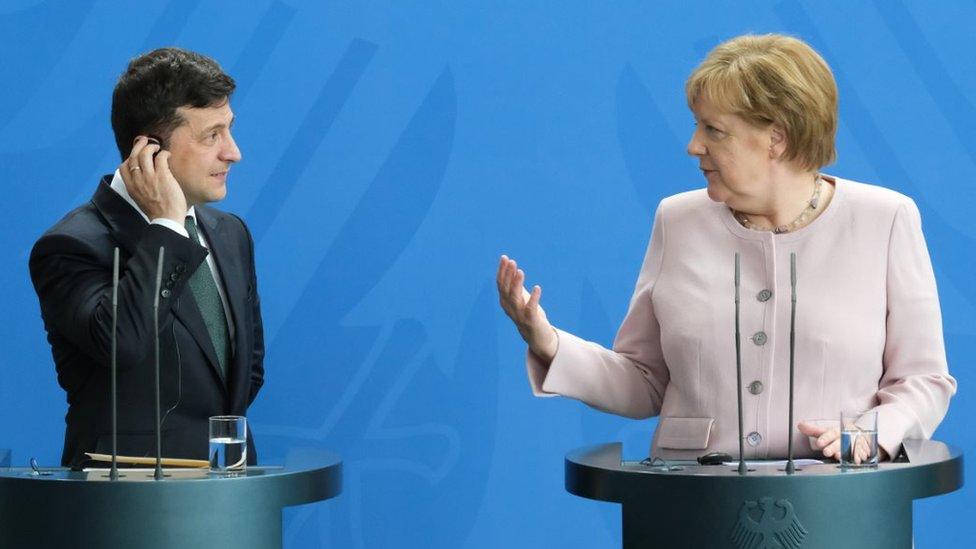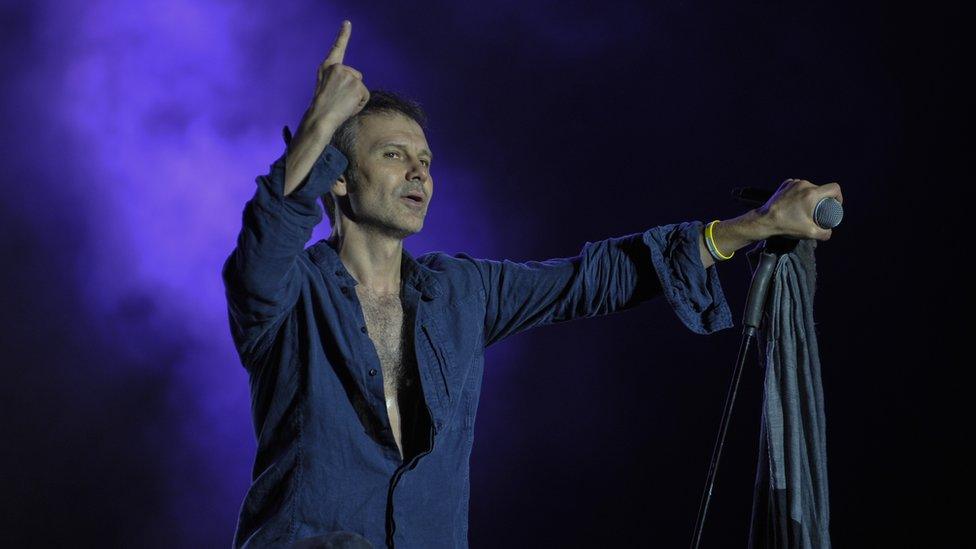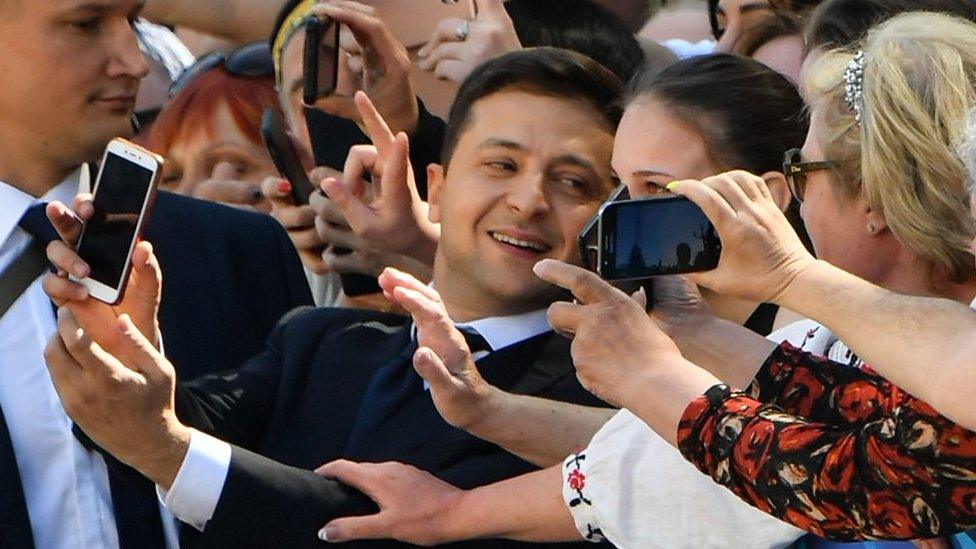Volodymyr Zelensky: Why Ukraine's new president needs second election win
- Published
Volodymyr Zelensky arrived for his inauguration with high fives and selfies
It's two and a half months since Ukraine's comedian-candidate Volodymyr Zelensky won a big victory in the presidential elections.
It was hailed as a political earthquake at the time, but Mr Zelensky has so far been unable to appoint the ministers he wants, or turn his electoral promises into legislation.
That could all change after 21 July parliamentary elections, called by the new president the moment he was sworn in in May.
A strong showing for his party would give him the power to do pretty much as he wishes. Otherwise, he could have a long and frustrating five years in office.
How's Zelensky doing ?
All manner of criticism was thrown at Mr Zelensky during the presidential campaign.
He was either a puppet of controversial oligarch Igor Kolomoisky or a stooge for Russian President Vladimir Putin, depending on who you listened to.
It's very early days but the indications so far are that the president is trying to be his own man.
Yes, Mr Kolomoisky has returned to Ukraine from self-imposed exile and, yes, one of the oligarch's former lawyers has landed a plum job in the presidential administration.
But other key appointments, including some of Mr Kolomoisky's foes to key posts, have suggested that the new president is keen to distance himself from his former business partner, and at least try to deliver on his ambitious promises to shake up the political system and tackle Ukraine's endemic corruption.

Mr Zelensky has already been well received by some of Europe's top leaders
As for relations with Russia, the style is different but Mr Zelensky has for the most part continued his predecessor, Petro Poroshenko's strategy.
President Putin's decision to start giving Russian passports to people living in occupied parts of eastern Ukraine forced Mr Zelensky to respond robustly and ended the notion that there would be an immediate improvement in relations.
However, the two presidents have since held their first talks on the phone, in what some analysts in both Ukraine and Russia see as a sign that dialogue is possible after all.

There has been some de-escalation of the conflict in some areas but until the 24 sailors that Russia seized near the Kerch Strait last November are released, Mr Zelensky has very little wriggle room.
How much power does he have?
Ukraine's president is the head of state, but not the head of government. So Mr Zelensky's powers are limited. He can choose the prime minister but Ukraine's parliament, the Verkhovna Rada, has the power of approval or dismissal.
Therefore, despite his landslide victory, President Zelensky has so far been saddled with what is effectively the Poroshenko government. Efforts to dismiss ministers, or even get their resignations accepted, have been blocked by MPs.
It's meant a dysfunctional period of government, which got a very public airing when Mr Zelensky held a press conference to complain that Poroshenko-appointed Foreign Minister Pavlo Klimkin was communicating with Russia without consulting him, and that he had only heard about it "from the internet".
What are his election victory prospects?
If the "old guard" was hoping to dent Mr Zelensky's popularity by thwarting his plans, it doesn't seem to be working.
The more that MPs have obstructed the newcomer, the higher his party, Servant of the People, has risen in the opinion polls.
Named after Mr Zelensky's presidential TV series, the party has for more than a month been consistently polling between 40-50%, which would give him the numbers he needs in the new parliament.
As Servant of the People has promised not to include anyone who has previously been an MP on their lists, the new parliament is likely to be full of newcomers.
Will he look for a coalition with another entertainer?
Throughout 2018, before Volodymyr Zelensky emerged, there was widespread speculation that the lead singer of one of Ukraine's most popular bands might be the protest-vote candidate.

Svyatoslav Vakarchuk,, lead singer of renowned band Okean Elzy, is also eyeing election success
For reasons that were never fully explained, Svyatoslav Vakarchuk declined.
But he has now formed his own political party called Holos (The Voice) and it's polling at about 8%.
It has attracted reform-minded individuals and could potentially form a coalition with Servant of the People. His rock group, Okean Elzy, is still touring, external.
Who else to look out for
Second in the opinion polls is the most pro-Russian of the parties, Opposition Platform - For Life, which is set to pick up most of its votes in the east.
That has left the parties of Ukraine's former political heavyweights, Petro Poroshenko and Yulia Tymoshenko, sweating over whether they will get over the 5% threshold needed to enter parliament.
This could be particularly humiliating for Mr Poroshenko who, having been trounced by Mr Zelensky in April, is refusing to go quietly from the political scene.
His political party has been rebranded without his name, and is now called European Solidarity. Even if it does get over 5% (and currently it polls around 8%), they are still likely to be bit-part players at best in the next parliament.
- Published20 May 2019
